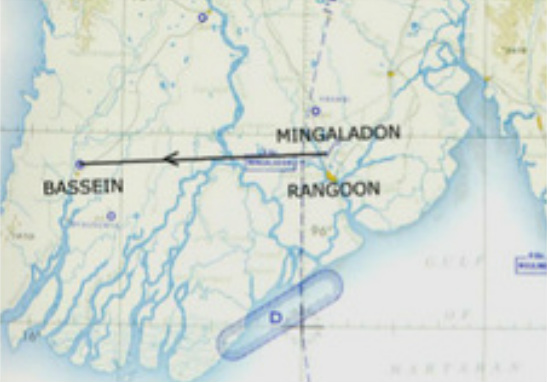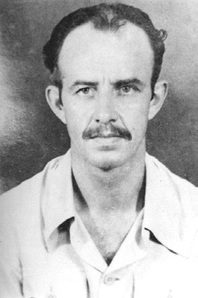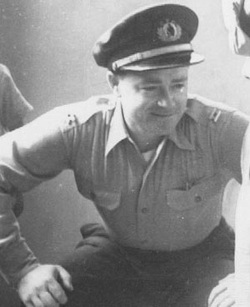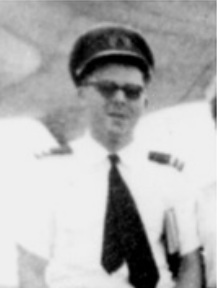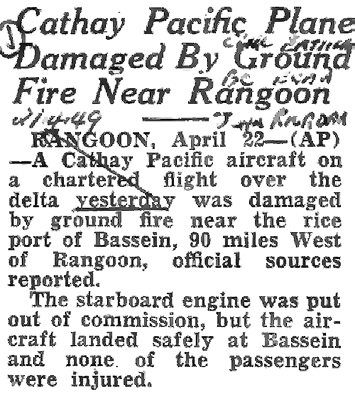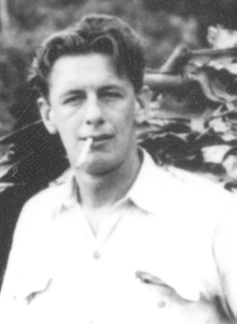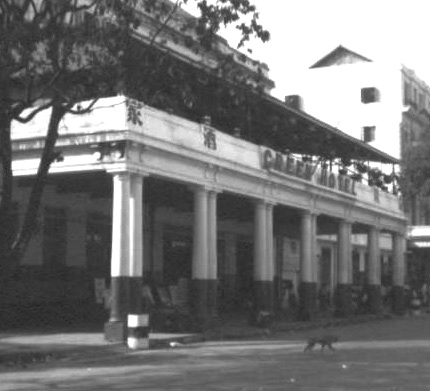Flying on 'Braille'
(Niki Shot Down - In which Niki takes a bullet and her downfall proves to have been her salvation.)
April 21 was a miserable day. The clouds were swollen with the monsoon rain. They seemed close enough to touch. Had our brilliant Sol conceded defeat? His light barely filtered through the overcast. The little that did come was an unhealthy yellow. Even sinister, for nothing did cast a shadow. A day when Death would be in his element.
John Riordan and I were the flying team. Bo Egan was our radio man.
John Riordan and I were the flying team. Bo Egan was our radio man.
Bassein
Our skipper would pick this day to give me a rare treat. With natural cunning he had hedged his bet. I was to do my take-off from the right seat.
Bo's well-nourished face, lost half its tan.
In a wavering voice, John went through the take-off check list. He said. 'Tail-wheel locked.' I threw it in with a joyful rasp. Bo's face lost the rest of its tan. With a gulp he put on his belt, this he never did. He reflected, then gave it a hefty cinch. Was this my friend?
To their surprise and my delight everything had gone well. A gentle turn set our heading for the delta city of Bassein. Just beyond our invisible horizon trouble lay in wait. The sort where the wrong decision would tear away lives.
We were now some sixty miles into the trip at 500 feet. The heavy squalls were brief and were over in seconds. Our forward visibility was reasonable. All was going fine.
Our skipper would pick this day to give me a rare treat. With natural cunning he had hedged his bet. I was to do my take-off from the right seat.
Bo's well-nourished face, lost half its tan.
In a wavering voice, John went through the take-off check list. He said. 'Tail-wheel locked.' I threw it in with a joyful rasp. Bo's face lost the rest of its tan. With a gulp he put on his belt, this he never did. He reflected, then gave it a hefty cinch. Was this my friend?
To their surprise and my delight everything had gone well. A gentle turn set our heading for the delta city of Bassein. Just beyond our invisible horizon trouble lay in wait. The sort where the wrong decision would tear away lives.
We were now some sixty miles into the trip at 500 feet. The heavy squalls were brief and were over in seconds. Our forward visibility was reasonable. All was going fine.
I began our run over the north end of the strip. Suddenly we began to draw small-arms fire. Our right engine took a hit. It lost all power and flames licked my sliding window. Acrid smoke was pouring through the joins of the dural floor. It soon filled the flight-deck.
John grabbed the controls. He ordered. 'See what you can do back there!'I grabbed the extinguisher and rushed into the cabin. It was clear. The smoke was coming through the centre-section floor. The fire was out of my reach. As I turned, Bo appeared out of the smoky gloom. He yelled. 'I'll monitor the rear door in case we have to force land.' I thought what a sound idea.
I slipped into my seat. Then I saw that he was losing our battle. John had been unable to get the right engine to run. Neither was the port engine doing much work. The trees were close enough to see the leaf veins. He screeched that he was going to put her down straight ahead. I bellowed. 'We'll be killed, if you do.'
I could see something he had been too busy to notice. Great earthworks surrounded the paddy-fields. They were wide enough on which to drive a bullock-cart.
I said. 'Let's try for the strip.' It was elusive. It would come and go in squally rain. I suggested that he stick with the flying. I would set the speed by juggling the engine.
Our combined efforts would work out splendidly. In a splatter of mud divots we landed. I felt exhausted.
Bo, was loud in praise, but got us back to reality. He said that he could still hear gunfire. We should do something about our plane! Bo got our signal off to Mingaladon. We thought it clear and precise.
John grabbed the controls. He ordered. 'See what you can do back there!'I grabbed the extinguisher and rushed into the cabin. It was clear. The smoke was coming through the centre-section floor. The fire was out of my reach. As I turned, Bo appeared out of the smoky gloom. He yelled. 'I'll monitor the rear door in case we have to force land.' I thought what a sound idea.
I slipped into my seat. Then I saw that he was losing our battle. John had been unable to get the right engine to run. Neither was the port engine doing much work. The trees were close enough to see the leaf veins. He screeched that he was going to put her down straight ahead. I bellowed. 'We'll be killed, if you do.'
I could see something he had been too busy to notice. Great earthworks surrounded the paddy-fields. They were wide enough on which to drive a bullock-cart.
I said. 'Let's try for the strip.' It was elusive. It would come and go in squally rain. I suggested that he stick with the flying. I would set the speed by juggling the engine.
Our combined efforts would work out splendidly. In a splatter of mud divots we landed. I felt exhausted.
Bo, was loud in praise, but got us back to reality. He said that he could still hear gunfire. We should do something about our plane! Bo got our signal off to Mingaladon. We thought it clear and precise.
Bob Smith
Our message read. 'starboard engine stopped. Cockpit filled with smoke!' Little wonder ground-engineer Bob Smith, thought it weird. It told him nothing.
What should he take? He just piled some junk into the Norseman. This would be the same plane to bring notoriety to Ken Begg. His story is still ahead.
His pilot was Paul Clevenger. Paul had never before flown a Norseman. He showed this throughout the 80-odd miles to our rescue. Each mile would bring Smithy closer to a fit.
While the plane was moving I saw him hurling things out the door. He followed them in a twirling ball. He scrambled to his feet. He began screaming with rage. 'Bugger-off you stupid bastard. I'd be safer with the Karens.' Paul took the hint! He cut away in a swirl of divots.
Since we had been shot-down the firing had been sporadic. Now it had set in and was heavy. Bullets were screaming overhead. We kept an anxious eye on Smithy. His thumbs-up was our signal to fire-up. Without an engine check we got the hell out of there.
Perhaps, we need not have been so hasty. The Karen's did capture Bassein early in the new year. Government forces soon regained the initiative. Its liberation marked a rare success.
On the way back, Bob, would give us the details. Look as he might he could find nothing. A more careful check would show a small hole in the wing's leading-edge. Then he scrambled onto the wing's top. He found a gaping hole. It was there the bullet had come out.
He opened the access panel. The shot had gone right through the centre of the fuel line. Its path had flared the line. It was double its normal diameter.
Luckily his junk included some hi-pressure hose and clamps. He cut around the damaged section. Then he bell-mouthed the ends, slipped on the hose, and tightened the clamps. He said. 'It's only a temporary repair, but it will get us back.'
He concluded. 'That's why your motor stopped. No fuel was getting to the engine. The fire went out because the rush of fuel was too great. Its gush smothered the flames.'
He looked under the flight deck panels. There he found all the zinc chromate burnt brown. The protective grease on the control cables was a mass of blisters.
Our message read. 'starboard engine stopped. Cockpit filled with smoke!' Little wonder ground-engineer Bob Smith, thought it weird. It told him nothing.
What should he take? He just piled some junk into the Norseman. This would be the same plane to bring notoriety to Ken Begg. His story is still ahead.
His pilot was Paul Clevenger. Paul had never before flown a Norseman. He showed this throughout the 80-odd miles to our rescue. Each mile would bring Smithy closer to a fit.
While the plane was moving I saw him hurling things out the door. He followed them in a twirling ball. He scrambled to his feet. He began screaming with rage. 'Bugger-off you stupid bastard. I'd be safer with the Karens.' Paul took the hint! He cut away in a swirl of divots.
Since we had been shot-down the firing had been sporadic. Now it had set in and was heavy. Bullets were screaming overhead. We kept an anxious eye on Smithy. His thumbs-up was our signal to fire-up. Without an engine check we got the hell out of there.
Perhaps, we need not have been so hasty. The Karen's did capture Bassein early in the new year. Government forces soon regained the initiative. Its liberation marked a rare success.
On the way back, Bob, would give us the details. Look as he might he could find nothing. A more careful check would show a small hole in the wing's leading-edge. Then he scrambled onto the wing's top. He found a gaping hole. It was there the bullet had come out.
He opened the access panel. The shot had gone right through the centre of the fuel line. Its path had flared the line. It was double its normal diameter.
Luckily his junk included some hi-pressure hose and clamps. He cut around the damaged section. Then he bell-mouthed the ends, slipped on the hose, and tightened the clamps. He said. 'It's only a temporary repair, but it will get us back.'
He concluded. 'That's why your motor stopped. No fuel was getting to the engine. The fire went out because the rush of fuel was too great. Its gush smothered the flames.'
He looked under the flight deck panels. There he found all the zinc chromate burnt brown. The protective grease on the control cables was a mass of blisters.
Green's Hotel
Later that night we were at Green's Hotel. This was our favourite Rangoon watering-hole.
John was the centre of attention! Everyone wanted him to talk of our adventure. He said. 'It was IFR (instrument conditions of flight) outside. The cockpit filled with smoke and inside it became the same.'
In music-hall tradition we roared. 'What did you do?'
Quick as a flash he replied. 'We broke the glass in the dials. Then we finished the flight on Braille.'
The resultant applause brought down the house.
Later that night we were at Green's Hotel. This was our favourite Rangoon watering-hole.
John was the centre of attention! Everyone wanted him to talk of our adventure. He said. 'It was IFR (instrument conditions of flight) outside. The cockpit filled with smoke and inside it became the same.'
In music-hall tradition we roared. 'What did you do?'
Quick as a flash he replied. 'We broke the glass in the dials. Then we finished the flight on Braille.'
The resultant applause brought down the house.
What he did not say, pleased me most. It had occurred as we had scrambled to get away from Bassein. He threw himself in the right seat. Pointing at the captain's seat he quietly commanded - take us home. Bo and Smithy seemed pleased!
They would keep that 'temporary repair' for months. He had done it so well it passed all tests.
Our plane was Hong Kong registered VR-HDA. Pinky Wawn damaged her on January 5, 1947.It had happened during a short field landing at Macao. The wheels hit the reservoir wall. I told this story in Syd's Pirates.
She had comfortable seating. The only DC3 we had with fuel-dump chutes.
She was the last Dakota the company would keep. Cathay sold her on July 24, 1961.
They would keep that 'temporary repair' for months. He had done it so well it passed all tests.
Our plane was Hong Kong registered VR-HDA. Pinky Wawn damaged her on January 5, 1947.It had happened during a short field landing at Macao. The wheels hit the reservoir wall. I told this story in Syd's Pirates.
She had comfortable seating. The only DC3 we had with fuel-dump chutes.
She was the last Dakota the company would keep. Cathay sold her on July 24, 1961.

